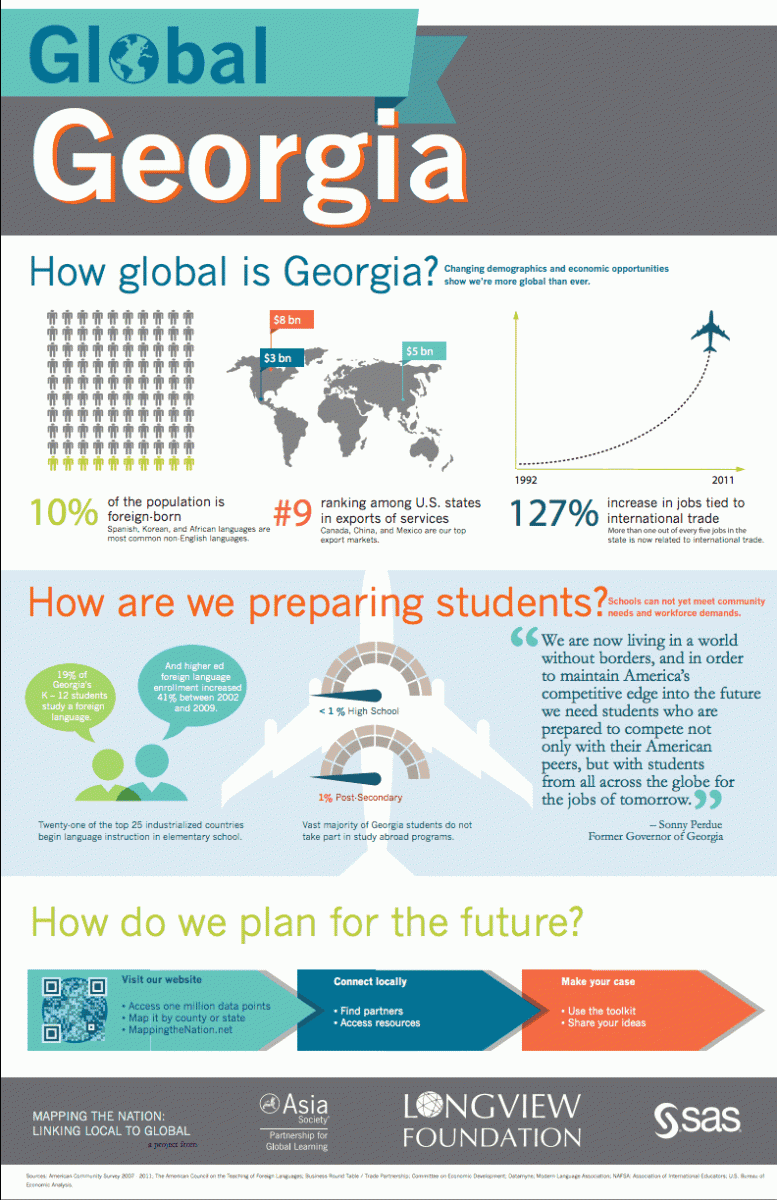Georgia
Georgia has had a long history of mostly grassroots international education initiatives. It's no surprise: the state has the sixth largest economy from international trade. Parents are savvy to the knowledge and skills students need to succeed in the global innovation age. Read on.

Afterschool/Extended Learning
There are several out-of-school time programs throughout Georgia that have a global focus in their programming. These programs introduce their students to other cultures through partnerships with Peace Corps volunteers, video conferences with young people in other countries, globally focused curriculum.
In 2013, the state of Georgia provided leadership in afterschool space and developed first the Georgia Afterschool & Youth Development Conference. This statewide conference has offered workshops that incorporate elements of cultural competence and globally relevant curriculum in both 2013 and 2014. In 2014, the Georgia Statewide Afterschool Network also partnered with the Asia Society to deliver a workshop on the importance of global learning to out-of-school time professionals at the Beyond School Hours conference in Atlanta. Additionally, the state recently developed the Georgia Afterschool & Youth Development Quality Standards, which include standards and indicators on cultural competence and global learning.
World Languages
In response to the limited number of dual-immersion programs in Georgia, there is an action plan in place to increase the number to 20 dual-immersion programs by 2020. Early steps include a pilot program overseen by GaDOE with six elementary schools to become dual-immersion programs, strengthening the K-12 language pipeline, and possibly result in stronger linkage to the out-of-school-time (OST) fiel.
Recently, the Georgia State Board of Education adopted a series of K-5 performance standards, which enables the state to offer a full K-12 series in Modern Languages. Additionally, 23% of Georgia's K-12 students are enrolled in foreign language, as compared to 17% nationwide. The state has also re-launched the Georgia International Education Statewide Advisory group, and intends to include members from the Georgia business community along with teachers, administrators, and university faculty.
Workforce Development
Georgia responded to the Skills Gap problem by creating the Career Pathways program in 2011, which was followed in 2012 by the Global Workforce Initiative (GWI). The GWI was created to facilitate cooperation among the business and educational communities to ensure Georgia students received the skills training and global competency instruction necessary to qualify for jobs that were going unfilled. The GWI arose out of relationships with key executives in global businesses with Georgia operations and through strategic partnerships with educational institutions in other countries, including Germany, France, Finland and Korea. Since that time, GWI has worked extensively with international businesses, their consulates and chambers of commerce to develop solutions, including skills training and instruction in foreign languages, entrepreneurship and other important career concepts. Ultimately, the Career Pathways and in-context GWI programs enable participating students to graduate with a certification in a skill of their choosing, which helps them to gain employment after graduation. Additionally, GWI partners provide internships and other work-study opportunities (including overseas programs) that function as pipelines to employment. Finally, students may also continue their schooling by seeking a degree at a technical college or university in their chosen skill or any other area.
Case Studies
Benefits of Georgia Sister School Partnership Program
Resources
Foreign Language Association of Georgia
Georgia Department of Education: World Languages and Global Initiatives
Georgia International Workforce Development Initiative
World Affairs Council of Atlanta
Savannah Council on World Affairs
Southern Center for International Studies
Contact
Greg Barfield, Ed.D.
Georgia Department of Education
Program Specialist: World Languages and Global Initiatives
Tel: (404) 651-5363
Fax: (404) 657-7489
[email protected]
Global Competence Resources
Asia Society Partnership for Global Learning and the Council of Chief State School Officers (CCSSO) partnered to define global competence and the skills and abilities that students need to demonstrate to be globally competent.